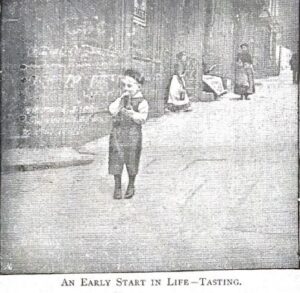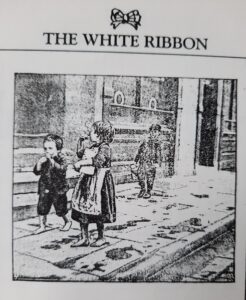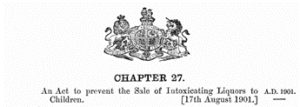Sunday 16th May 2021 is National Children’s Day – #NCDUK2021 – which is ‘all is all about the importance of a healthy childhood, and how we need to protect the rights and freedoms of children in order to ensure that they can grow into happy, healthy adults.’
I thought that it would be good to take a look back to 1901, when important legislation came in to force to protect children – The Intoxicating Liquor (Sale to Children) Act. This act prohibited the sale of alcohol to children under 14 years of age, unless it was in a pint measure that was corked and sealed for consumption off the premises.
The women of our forerunner, the British Women’s Temperance Association (BWTA), had already been highlighting the need for legislation regarding the sale of alcohol to children and the custom of parents sending young children to public houses to bring liquor home for consumption. They were passionate in their campaign to highlight the dangers this posed to the wellbeing of these children used as ‘messengers’.
In 1893 an article in the BWTA periodical, The Journal stated that the law at the time forbade the sale of drink to children (up to a certain age) for consumption on the premises, but that children of any age could be messengers so long as the liquor was for consumption off the premises.
 It is hard to imagine in this day and age, that it was not an uncommon sight to see children as young as four and five years of age, being sent to the pub with jugs or cans to bring home alcohol. The 1893 article even states that is was so prevalent, that many pubs provided steps for the little ones to climb on, so that they could reach the counter for the barman to fill up the jug!
It is hard to imagine in this day and age, that it was not an uncommon sight to see children as young as four and five years of age, being sent to the pub with jugs or cans to bring home alcohol. The 1893 article even states that is was so prevalent, that many pubs provided steps for the little ones to climb on, so that they could reach the counter for the barman to fill up the jug!
It was in this way that children were said to be sipping the drink on their way home and getting a taste for liquor at a very young age. Publicans were also in the habit of giving the children sweets as an ‘inducement to such trade.’
The need for legislation in this area to protect these children was clearly called for, although it was to be another eight years before the 1901 Act came into force.
In order to campaign to protect the moral and physical health of these children, the BWTA formed a department for the Prevention of the Sale of Intoxicants to Children. Public opinion was being roused on the subject by temperance campaigners such as the BWTA and the Church of England Temperance Society, with petitions and deputations put before Parliament.
The 1901 Act was a step in the right direction for the BWTA’s campaign, but their ultimate aim was to prevent the sale of alcohol to children altogether, as this Act only restricted sales to children rather than prevented it.
From 1st January 1901, when the Act came into force until June, it was reported that there were nearly 2000 prosecution cases in over 200 towns, and in nearly all of these the cases the insufficient sealing of the vessels with paper labels was the cause. The Act allowed for the sale of liquor in closed vessels, with the legislation defining ‘corked’ as ‘closed with a plug or stopper, whether it is made of cork or wood, or glass, or some other material.’ This would lead to some interpretation of what other material was used to close the vessel sufficiently to comply with the law.
Publicans who continued to sell alcohol to children (in certain areas of the country such as Liverpool, some Magistrates had already chosen to stop all sales to children), were in confusion as to what constituted a seal. The use of wax seals was recorded as ‘troublesome and vexatious’, but gummed labels became moist and removable and licensees were convicted under the act when labels failed. One mother was prosecuted even though she sent a corked bottle as she believed that the publican would then seal it up. The question of sealing the vessels was something that needed some determination by the Courts.
 An article in the BWTA periodical ‘The White Ribbon’ of February 1902, acknowledged that the way forward to promote enforcement of the Act, should be to urge parents and guardians to refrain altogether from sending children under 14 years of age to ‘the drink shop’. Adult ‘touts’ were known to stand by the door of the pub to assist children in obtaining liquor. The BWTA wanted to extend their moral influence; that intoxicating drinks should be kept out of the reach of children and that by the action of the law that children should be kept out of public houses altogether.
An article in the BWTA periodical ‘The White Ribbon’ of February 1902, acknowledged that the way forward to promote enforcement of the Act, should be to urge parents and guardians to refrain altogether from sending children under 14 years of age to ‘the drink shop’. Adult ‘touts’ were known to stand by the door of the pub to assist children in obtaining liquor. The BWTA wanted to extend their moral influence; that intoxicating drinks should be kept out of the reach of children and that by the action of the law that children should be kept out of public houses altogether.
Magistrates were enforcing the law, with the ‘sealing’ issue identified as a main contributor to the number of prosecutions being brought. Authorities on the liquor trade were advising wax as a safer option to paper seals, but more and more licensee’s were deciding not to sell to under 14’s. Of course it was inevitable that attempts were made to evade the law, by getting an adult to hand a jug of liquor to a child outside the pub, but this failed and both the parent sending the child and the one ‘aiding and abetting’, were fined.
The BWTA continued in their steadfast determination to educate public opinion as to the ‘evils of the closed vessel; of allowing lads and girls from 14 to 18 to frequent public houses; and to prevent infants in arms or young children being taken into public houses.’
It is quite shocking to read one publican’s account of returning home at quarter to twelve at night to discover six women in the bar with as many children. He described how the ‘poor little things were crying to go home,’ but the women’s answer was ‘in the form of pouring gin and water, and in some cases beer, down the throats of the little ones, not one of whom was over eight years old.’ It seems that the BWTA had a justifiable aim in wanting to protect the children exposed to such behaviours.
Further protection measures came into place, with The Licensing Act of 1902 which allowed for the power to apprehend a person found drunk in charge of a child under seven years of age. Significantly, the Intoxicating Liquor Act (Sales to Persons under 18) came into force in 1923, prohibiting the sale or purchase of alcohol to or by any person under 18 years of age.
I don’t think we can call it ‘the good old days’ when children as young as four and five were standing on boxes at bar counters and bringing home jugs of beer for their parents, whilst having a little taste on the way home! Whilst the White Ribbon Association as we are known today, no longer promotes total abstinence as in the days of the BWTA, we continue to raise awareness into the effects of alcohol, drugs, smoking and gambling.
Further information on the services we provide please click HERE
https://www.nationalchildrensdayuk.com/
#NCDUK2021

